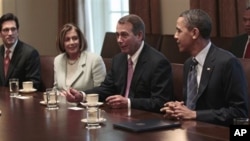In the United States, the political struggle over how to reduce mounting federal budget deficits and the national debt took a new turn on Wednesday as President Barack Obama offered his plan to trim trillions of dollars during the next several years. Congressional Republicans have already offered a competing deficit reduction plan that is more focused on budget cuts, and it is expected that the debate over how to reduce the size of government will remain front and center well into next year's presidential election campaign.
Under President Obama's approach, the national debt would be reduced through a combination of spending cuts, tax increases on the wealthy and a modest effort to reduce costs of the government-run health care program for the elderly known as Medicare.
"To meet our fiscal challenge, we will need to make reforms," said President Obama. "We will all need to make sacrifices. But we do not have to sacrifice the America we believe in. And as long as I'm president, we won't."
The Obama plan would cut $4 trillion from projected budget deficits during the next 12 years.
Congressional Republicans have drafted their own deficit reduction blueprint that would trim the national debt by more than $5 trillion during the next 10 years. But there are major differences in how the plans would reduce the debt.
The Republican proposal focuses more on spending cuts and would seriously alter the Medicare program to make individuals more financially responsible for their health care expenses as they grow older.
Another major difference is on the issue of taxes. President Obama would let Bush-era tax cuts for wealthy Americans expire, while Republicans say they will not agree to new tax increases.
"We can't tax the very people that we expect to reinvest in our economy and to create jobs. Washington has a spending problem, not a revenue problem," said Republican Speaker of the House of Representatives, John Boehner.
Republicans, Democrats and President Obama managed to avert a government shutdown last week and came to an agreement on additional spending cuts for the 2011 federal budget that amount to $38.5 billion.
But the battle over the 2012 budget and beyond involves efforts to cut trillions of dollars from the national debt, which now totals more than $14 trillion.
Political experts say the vastly different approaches of the two major political parties to cutting the budget deficit will be on display in the months ahead and will continue to reflect a clash of worldviews on the role and scope of the central government.
John Fortier monitors U.S. politics at the Bipartisan Policy Center in Washington. He spoke on VOA's "Encounter" program.
"Republicans, especially the newly-elected Republicans [in Congress], wanting to show that smaller government and less spending is what they came to Washington to do," said Fortier. "And for Democrats to say, 'Look, we believe in a fairer America with social programs that are necessary and these cuts have gone too far,' there are a lot of specifics in this, but in a way it is a big argument over what the big direction of America is."
The growing budget debate stems from last November's U.S. congressional midterm elections in which Republicans retook control of the House and made gains in the Senate, in large part because of voter concerns over government spending.
But translating those concerns into actual budget-cutting action can be difficult, says Reid Wilson, editor of the National Journal Hotline political newsletter, who spoke recently on the CSPAN public affairs television network.
"Everybody wants to cut spending," said Wilson. "Everybody wants to cut the budget. But if you name a specific program, they are almost entirely against cutting that specific thing - whether it is Medicaid [the health care program for the poor and disabled], whether it is Medicare, whether it is defense spending."
That will apply especially to the debate over changing the Medicare program. Medicare is politically popular with older Americans who historically have resisted changes in benefits and who have demonstrated an eagerness to vote when they feel the program is under threat.
The domestic political battle over the budget is being closely watched abroad, says Brookings Institution political analyst William Galston.
"The United States plays a central role not just militarily and diplomatically, but economically," noted Galston. "If we regain our balance economically, that is good news for the world economy."
A new USA Today/Gallup public opinion poll found that Americans oppose major changes to Medicare by a two to one margin. The poll also found that most voters approve of the recent deal on the 2011 federal budget, but that they are divided over how to proceed with further cuts in the years ahead.
Budget Debate Continues to Define US Politics
- By Jim Malone












